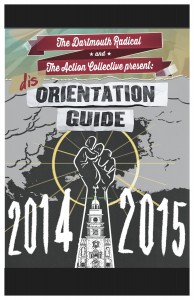As freshmen began their Dartmouth experience this term, a curious few found a tacky pamphlet sequestered on the lower tier of Daily Dartmouth newsstands. Titled the Dis-Orientation Guide, the forty-three-page tract published by “The Dartmouth Radical and the Action Collective” certainly succeeded in disorienting ’18s, who found themselves asking, “Who are these people? Why are they so mad?” and “Why should I care?” The publication’s potpourri of articles ranges from blandly constructive to incomprehensible to purposefully incendiary and destructive. It is regrettable that tidbits of useful information—useful for all students regardless of their background—were congealed in such an inflammatory publication, ensuring that many students will not receive them.
The Dis-Orientation Guide unfortunately poisons the well for the vast majority of incoming Dartmouth students. Instead of advising freshmen on how to behave in fraternities , one writer responds to a hypothetical defender of the Greek system with, “So you basically said that we need, like can’t survive, without racism, classism, sexism, homophobia, xenophobia, and all other structural oppressions. Well s**t, if you like it then I love it.” It continues running like a pyromaniac through a field of straight, white, rich, male, cisgender, WASP-y, tenth-generation-American straw-men by countering the comment, “You always protest and whine about Dartmouth. What do you all want?” with the answer, “Ummmm. [sic] We just out here trynna [sic] function. We would really love it if ya’ll [sic] treated us with respect…And we really really would love if ya’ll [sic] could stop being racist, sexist, homophobic, xenophobic, classist, etc…but we know that takes time [emphasis added].” While there are likely a few Dartmouth students that resemble the aforementioned strawmen, most people on campus tend toward respect, regardless of who they are, as long as they are respectful to those around them. Human psychology suggests that the reason many people do not respect the writers is that the writers seem to lack respect for their fellow students.
Nowhere is this more clear than when the hypothetical question, “You’re all too angry. If you’d just talk to us nicer…” is answered with the statement, “I’m not angry. I’m enraged. It’s levels to this s**t homie. Catch up.” What the author fails to understand is that this attitude is the very reason why there is often little patience for The Dartmouth Radical and The Action Collective and it hurts the very people they claim to support. The most prominent example of this type of acerbic language is a piece entitled “F*** Your White Tears,” whose authors manage to turn off almost every reader from taking seriously their boilerplate rhetoric about “structural oppression” and the Greek system.
The caustic language is not even the most troubling part of the Dis-Orientation Guide. While The Radical and the Action Collective claim to tout inclusivity and tolerance, they discount the perspectives of the overwhelming majority of Dartmouth students. The egregious identity politics contained within are inherently divisive, sharply delineating the difference between white and nonwhite, “Ally” and “oppressor.” A superficially noninflammatory piece titled “What is Pan Asian?” readily demonstrates this framework. In rhetoric reminiscent of the Greater East Asia Co-Prosperity Sphere, the article’s author articulates how Asians are united in their “otherness.” It then takes the Herculean leap of asserting how this Pan-Asian construct is further allied with other minorities, dangerously ossifying the white-against-nonwhite fault lines that have so poisoned discourse on this campus. In the end, this rhetoric is self-defeating, creating a reactionary binary instead of recognizing diversity, equality, and other purportedly sacrosanct progressive values. Instead of identifying as Chinese-American or Asian-American or any other Hyphenated-American as the author so suggests, consider the idea that we should just identify as American.
What we can dredge up from these “enraged” aspiring revolutionary Communards is is a clear attitude of antagonism against the world at large, akin to that of a brainwashed, radicalized, foot-soldier of some far-off regime. Their ideological underpinnings evident in their screed evinces the fanaticism of, say, Hiroo Onoda, a lieutenant in the Imperial Japanese army during the Second World War. Onoda was told to hinder Allied air operations by any means on Lubang, one of the Philippine Islands, and to avoid capture. He and three other soldiers fought a guerrilla war against the occupying Americans until 1945 and against the peaceful island residents afterwards until 1974, deriding pamphlets, surrender orders from the Japanese high command, and even the presence of Onoda’s own brother as artful tricks of the American forces.
Like the aforementioned Japanese officer, the Dis-Orientation Guide’s authors are siloed in an unassailable ivory tower of identity politics, where every misfortune, every bigoted frat brother, every perceived snub is blamed on a conspiracy of “oppression” by what a Freedom Budget protestor last year labeled a “historically, prestigiously … exclusively white institution, um, who’s had a history in the economies of slavery and genocide.” As C.S. Lewis narrated of a faction of dwarves in The Last Battle, “Their prison is only in their minds, yet they are in that prison; and so afraid of being taken in that they cannot be taken out.” Instead of telling freshmen to be angry about the world and hide from it, perhaps we ought to be encouraging them to give Dartmouth a chance.
Brian Chen and Sandor Farkas contributed to this response.


Be the first to comment on "Which Orientation Guide?"